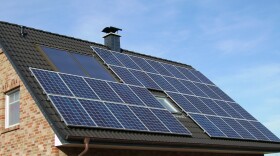DTE Energy and Consumers Energy say they want significant changes made to a rooftop solar bill.
The bill would let any homeowner with solar panels get reimbursed for the excess energy they put on the grid. Right now, the cap is set at only 1%. Consumers Energy has already reached that cap.
Bill sponsor Greg Markkenan says he's not surprised the utilities oppose the bill. He's a Republican who represents the 110th House District in the U.P. Markkenan says the rooftop solar industry creates good-paying jobs.
"It's moving Michigan to green energy and there's no reason why we should take until 2050 to do that," Markkenan says of the state's goal of net zero carbon emissions by 2050. "A lot of the states around Michigan don't have a cap at all. I mean we can continue to kick the can down the road, but at some point we're going to have to catch up with the rest of the states."
Markkenan says rooftop solar is a big issue for the energy-conscious U.P. He says the crucial role rooftop solar can play during emergencies was brought home to him during a visit he made to Texas over Easter.
"It's moving Michigan to green energy and there's no reason why we should take until 2050 to do that." Republican State Representative Greg Markkenan on how his bill to remove the cap on rooftop solar would help the state
"We have to move forward. The real heroes in the weather episode that they had were people that had rooftop solar," he says, noting those customers helped neighbors avoid freezing in the extended cold snap.
Markkenan says he thinks his bill, which has bipartisan support, can move forward without significant changes.
DTE Energy and Consumers Energy say they do support raising the 1% cap, but aren't saying by how much.
Utility representatives also say they are paying rooftop solar customers too much for the energy they produce.
"Under the current rate structure, the power exported to the grid is paid at a rate that is three times as high as the market rate," says Camilo Serna, DTE Vice President of regulatory affairs. "Second, private solar customers reduce their energy bills more than what Michigan saves on energy costs. Actually, private solar customers use the grid more than our average customers. These costs are then shifted to all our other customers."
Environmental groups argue, however, that the utilities are actually paying rooftop solar customers too little for the power they put on the grid, which is typically at times of peak demand in the summer. They say rooftop solar customers should get paid the same for the energy they put onto the grid as what they pay for the energy they use from their utility company.
The utilities' arguments have not recently been fully supported by the Michigan Public Service Commission. In recent rate cases, the Commission approved a compromise between the reimbursement rate proposed by environmental analysts and those proposed by DTE Energy and Consumers Energy.
Environmentalists say utilities now seem to be focused on getting the state Legislature to give them the concessions they want on rooftop solar, since they did not get what they want from the state's regulatory agency.
Editor's note: Consumers Energy is one of Michigan Radio's corporate sponsors.







